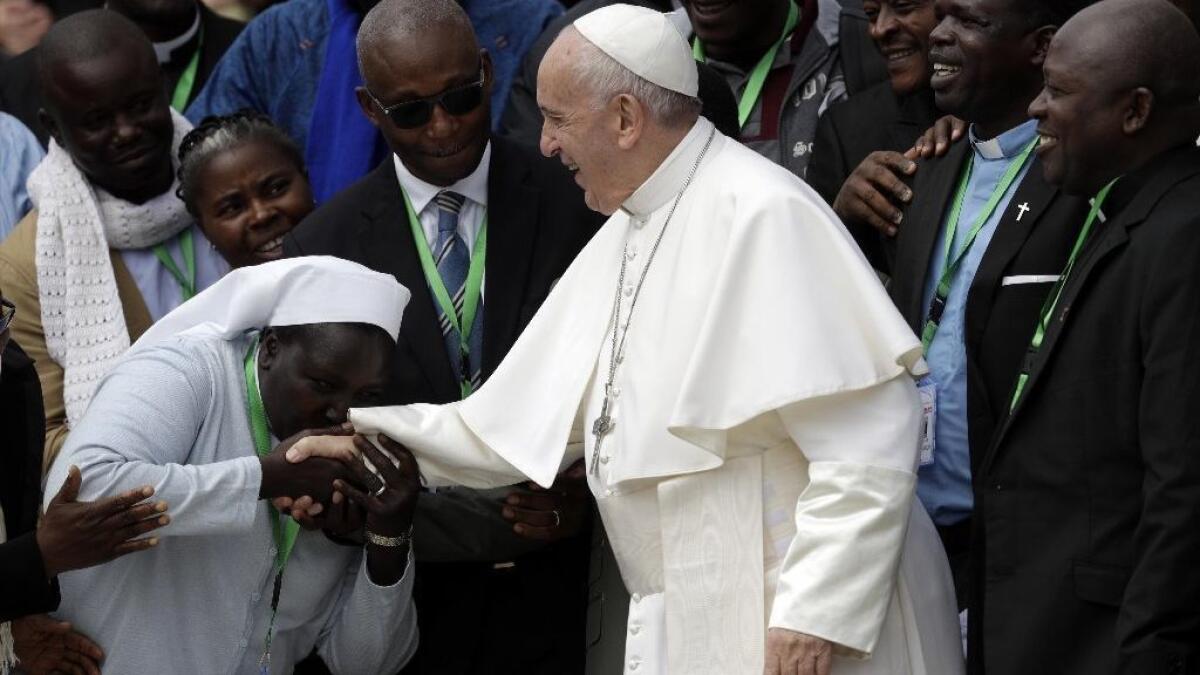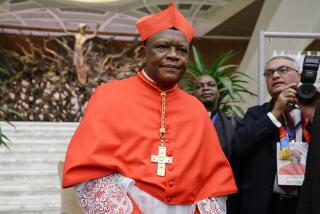Opinion: Is the pope Catholic? Not according to some cranky church conservatives

“Is the pope Catholic?” used to be a sarcastic rhetorical question that could only be answered “Yes.” But now, in the latest spasm of what might be called Francis Derangement Syndrome, 19 Catholic priests and academics — including Aidan Nichols, a prominent British priest and author — have raised the question in all seriousness and answered: “No.”
In an open letter to Catholic bishops, the signers of the letter say they are writing “to accuse Pope Francis of the canonical [offense] of heresy, and second, to request that you take the steps necessary to deal with the grave situation of a heretical pope.”
But the letter doesn’t deliver the goods, and it may actually work to the pope’s advantage in the Catholic culture wars.
“Heresy,” according to the Catechism of the Catholic Church, is “the obstinate post-baptismal denial of some truth which must be believed with divine and catholic faith or it is likewise an obstinate doubt concerning the same.”
So what evidence do the dissident conservatives offer for the argument that Francis is a heretic?
Not much.
The signatories condemn the pope for language in “Amoris Laetitia” (“The Joy of Love”), a 2016 document that has been interpreted as permitting divorced and remarried Catholics in some cases to receive Holy Communion. (Among the passages the authors of the letter apparently find shocking is one in which Francis says that divorced and remarried Catholics “need to feel not as excommunicated members of the church, but instead as living members, able to live and grow in the church.”)
But mostly the signers of the letter infer heresy from Francis’ actions and associations. As the letter puts it: “It is possible to demonstrate belief in a proposition by actions as well as by words.”
This allows the signers to accuse the pope of repudiating the church’s teaching against homosexual acts because he promoted or praised prelates who were accused either of sexual misconduct involving males (former Cardinal Theodore McCarrick) or of failing to deal firmly with abusers (Cardinal Donald Wuerl). Even if you think the pope has been insufficiently vigilant about sexual abuse by clerics, that’s a different matter from accusing the pope of denying church doctrine.
Another allegation of “heresy” involves Francis’ approval of an agreement with China that gives the government some say in the selection of bishops (an arguably unwise but not unprecedented accommodation to secular authorities). Then there is the bizarre claim in the letter that at a 2018 ceremony the pope carried a pastoral staff “in the form of a ‘stang,’ an object used in satanic rituals.” (Crux, a Catholic news service, reported that the allegedly diabolical staff was actually “an artistic representation of Christ on the cross presented to the pope at a youth event in Rome.”)
This letter is only the latest of a series of criticisms of Francis from church conservatives, some indirect or veiled but others overt and aggressive. In the latter category is the hysterical “testimony” of retired Vatican diplomat Carlo Maria Vigano, who last year accused Francis of rehabilitating McCarrick and being close to prelates who belong to a “homosexual current” in the Vatican. (Vigano is name-checked in this letter.)
But in accusing the pope of heresy, the signers of this latest broadside may have miscalculated. The manifest unfairness and absurdity of their letter will increase sympathy for the pope and put his more respectable critics on the defensive. Watch them scramble to disassociate themselves from it.
Enter the Fray: First takes on the news of the minute »
Follow the Opinion section on Twitter @latimesopinion and Facebook
More to Read
A cure for the common opinion
Get thought-provoking perspectives with our weekly newsletter.
You may occasionally receive promotional content from the Los Angeles Times.







